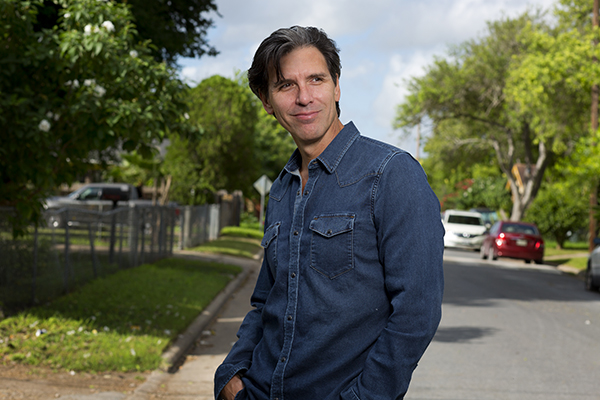Oscar Cásares was never the type to read as a child, and he spent most of his time outside. But when his tiós Nico and Hector came over for a carne asada cookout, Cásares ventured inside and listened to his uncles’ master storytelling.
“Sometimes (my uncles) would tell the same story over and over again, but I was fascinated with how they were able to keep our attention every single time,” Cásares, a UT creative writing associate professor, said. “It wasn’t until decades later I realized I had just been in a (storytelling) workshop.”
Cásares spent hours studying his uncles’ stories. From narrative to delivery, Cásares said they played a vital role in his development as a writer and the creation of his new book, “Where We Come From.” This story is centered around assimilation and the culture that is lost or gained in immigration.
“Where We Come From” follows the story of Orly, a 12-year-old boy who lives in Houston, Texas, and is forced to stay in Brownsville, Texas, with his godmother Nina after his mother’s sudden death. When Orly moves in with Nina, she is secretly providing refuge for a young immigrant boy named Daniel.
“I wanted my book to stand the test of time,” Cásares said. “So I didn’t want to tie it to a particular issue.”
Instead, Cásares said he wanted to focus on the community and family narratives, something his family showed him how to do.
Though immigration is the focus of many stories today, Cásares said he wanted to strip away politics as much as possible from his novel.
“The initial seed of the (novel) began with the immigration that occurs after assimilation,” Cásares said. “There’s the immigrant we see in the news, but then there’s this cultural immigrant — the one (who) established a life for themselves after immigrating.”
Cásares began wondering if these cultural immigrants could ever return to their origins. He said it shocked him how his nephews’ upbringings in Houston completely differed from his own upbringing in Brownsville.
English professor John Morán González said Cásares found a way to tell the story of the border beyond its geography, as migrants flock to cities such as Dallas, San Antonio and Houston — not just the Rio Grande Valley.
“Today, the ‘border’ experience has effectively expanded to include much more of the state’s geography through migrants,” González said. “In ‘Where We Come From,’ Cásares portrays Texas as a border state where the Valley isn’t just a distant outlier of ‘the Texas experience’ but rather the core of what that experience will become in the not-too-distant future.”
Radio-television-film senior Terry Salinas is from Brownsville and believes representation is not only necessary but it needs to be accurate in the current political climate.
“Is the representation of the border accurate for me?” Salinas asks. “Yes and no. Very few know how to accurately depict the border. What I see and hear at Brownsville does not compare to what I see in the media.”
Cásares said he knew his book would get caught up in the current political climate, but to him it’s a “humanitarian issue.”
“The Washington Post asked me to comment on the camps in Tornillo,” Cásares said. “All I said was, ‘What language are they crying in?’”





















